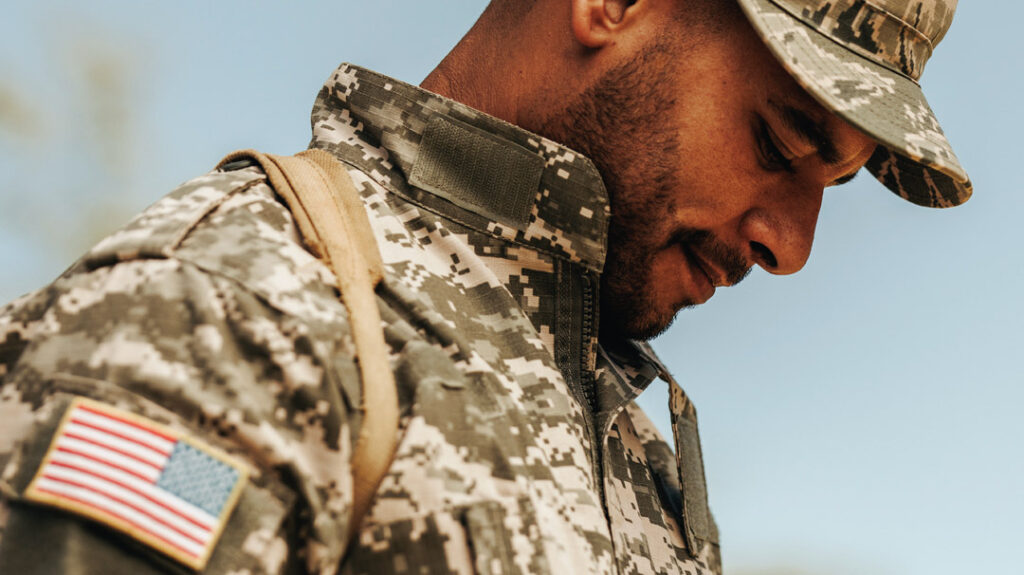
It’s no secret that many veterans struggle with drug and alcohol addiction. In the United States, there are nearly 20 million veterans. Of those, more than 10% have been diagnosed with a substance use disorder, which is slightly higher than the general population1. Sadly, many more go undiagnosed and, therefore, untreated.
Our veterans struggle with addiction for several reasons. First, they are more likely to experience Post-Traumatic Stress Disorder (PTSD) and other mental health conditions that can lead to substance abuse. Secondly, veterans often struggle to readjust to civilian life after serving in the military, leading to isolation and depression. Other reasons include exposure to traumatic events, depression and anxiety, and pain from injuries. As a result, many veterans turn to drugs and alcohol to self-medicate and cope with these issues. And even after getting treatment, they often relapse soon after because the reasons they became addicted – PTSD, the stress of readjusting, anxiety, and injuries – remain.
A Closer Look:
- An estimated 18.5 percent of veterans who served in Iraq and Afghanistan have post-traumatic stress disorder, and many turn to drugs and alcohol to self-medicate2.
- Half a million veterans misuse prescription pain relievers3.
- Over 50K veterans use heroin3.
- More than 2 of 10 veterans with PTSD also have Substance Use Disorders (SUD)4.
- Almost 1 out of every 3 veterans seeking treatment for SUD also has PTSD4.
Stigmas Prevent Treatment
When people think about veterans, they think about sacrifice, bravery, and toughness. These traits, combined with the stigmas attached to mental health issues and addiction, often make veterans reluctant to seek help. Without the support and treatment they need, veterans with drug and alcohol addiction often end up homeless, unemployed, in prison, or even worse, committing suicide. If we can end the stigma, more veterans will get the help they need – the help they deserve.
Treatment Options for Veterans
Veterans who suffer from addiction need specialized treatment that considers their unique experiences. Treatment should address the underlying causes of addiction, such as trauma, mental health issues, and pain. Veterans would also benefit from support from other veterans who understand what they’re going through.
Many good drug and alcohol treatment programs exist for veterans that can help them recover from addiction and live healthy, productive lives. The Department of Veteran Affairs (VA) offers such a program. Additionally, the VA will pay for a veteran’s treatment at any facility that accepts Medicare.
How Pretaa is Making Treatment Better for Veterans
We want to help America’s veterans because they sacrificed everything for all of us. We will fight the stigma and work hard to create better treatments for our veterans.
How? By focusing on the continuum of care.
Most treatment options end after a patient receives their medically assisted treatment or after they leave a treatment center, even though 59% of people relapse after the first week. The patient is left on their own.
We created a better way because we know that better connections equal better treatment. A wearable device allows healthcare providers to stay connected with patients and monitor their vitals. It indicates when things may go sideways and help to prevent a full-blown relapse. Or even worse, death. It ensures a connection with patients when they are most vulnerable, post-treatment.
We know it can be hard for veterans with an addiction to ask for help. But with Pretaa, they simply tap a little round “p” (for Pretaa) on their wearable device, and help is there for them. Everyday. Everywhere.
Are You a Veteran Looking for Help?
If you or someone you know is a veteran seeking help with drug and alcohol addiction, call the VA hotline for more information about available treatment services at 1-800-273-8255.
You can also call SAMHSA’s National Helpline at 1-800-662-HELP (4357) or visit their website for more information: https://www.samhsa.gov/find-help/national-helpline.
1. https://nida.nih.gov/publications/drugfacts/substance-use-military-life
3. https://www.caron.org/addiction-101/drug-use/statistics-and-demographics
4. https://www.ptsd.va.gov/understand/related/substance_abuse_vet.asp
